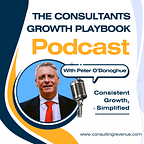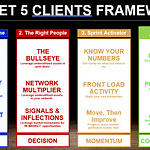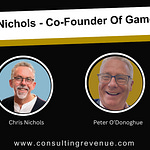Jesse discusses a live case involving a client struggling to implement a complex upskilling proposal, and elaborates on his approach to productizing solutions to ensure scalability and repeatability.
The full video is below:
Jesse emphasizes the importance of understanding human psychology and behavior change to drive successful transformations. He also touches on the concept of intrinsic motivation and how it is crucial for effective consulting.
Jesse shares his unique point of view on why big consulting firms often fail to deliver on execution and the importance of resilience, grit, and guided discovery in driving real impact for clients.
00:00 Welcome to the Consultants Growth Playbook
00:21 Jesse Hopps on Productized Consulting
01:57 Challenges in Executing Consulting Plans
03:47 Building Scalable Consulting Solutions
05:01 From Subscription Business to Consulting
09:29 The Consulting Industrial Complex
17:17 The Importance of a Unique Point of View
20:31 The Subconscious Barrier to Success
20:48 Manifesting Success: Beyond Wishful Thinking
21:20 The Real Reason Consulting Clients Fail
22:22 Intrinsic Motivation: The Key to Transformation
23:56 Self-Determination Theory Explained
25:48 Guided Discovery in Learning and Development
27:41 Holistic Growth Model for Business Transformation
27:58 The Importance of Mindset and Grit
34:31 Applying Psychology in Business Consulting
36:54 The Power of Flow in Business Development
38:02 Final Thoughts and Contact Information
PS: Sorry for my fuzzy audio and video on this one.
You can find Jesse online here:
And the pocast turned into an article:
Do You Know Why Your Expensive Training Programs Keep Failing?
The uncomfortable truth behind why corporate transformation initiatives stall has nothing to do with strategies and everything to do with psychology.
The Training Illusion Most Companies Fall For
Becoming successful doesn't just "happen" and neither do successful corporate transformations.
A company spends six or seven figures on a beautiful strategy deck from a big-name consulting firm. Everyone nods appreciatively during the presentation. The leadership team feels good about taking action.
You implement some training programs to support the new direction.
And then... nothing really changes.
If this pattern sounds familiar, you're caught in what Jesse Hopps of Demand Metric calls "the consulting trap" - the false belief that if people just knew what to do, they would do it.
But we all know that's not how humans work.
The Psychology Behind Failed Transformations
Think about your own life for a moment. Do you know what you need to do to get in the best shape of your life? Of course you do. So why aren't you doing it?
The same applies to corporate transformations. Knowledge isn't the bottleneck behavior change is.
"People don't act differently until they think differently," Hopps explains. "We've got to attack how people are thinking and their mindset before we can even consider getting them to act differently."
This insight might seem obvious when we reflect on our personal lives, yet somehow most companies miss it entirely when designing transformation programs.
The Three Requirements for Intrinsic Motivation
According to Self-Determination Theory (which has been studied for over 50 years), adults need three key elements to be intrinsically motivated:
Autonomy: People must feel they have a choice. You can't force change - they need to want it themselves.
Competence: They need to feel capable of developing the skill, with access to the right tools and resources.
Relatedness: The training must feel relevant to their daily work, and they need to feel socially supported in a safe environment.
When any of these elements is missing, your transformation program is likely doomed before it starts.
Why Big Consulting Firms Miss the Mark
Traditional consulting models are built on dependency, not transformation. As Hopps puts it:
"The big consulting firms take advantage of [human resistance to change]. They know that people aren't going to change. They know that people inherently want to avoid change and stay comfortable with what's known, even if that's what's killing their business."
These firms excel at diagnosing problems and prescribing solutions, but they're not structured to support the messy, human side of implementation. They deliver the strategy, then suggest you "find some cheap labor" to execute it.
The Holistic Growth Model That Actually Works
After years of seeing this pattern play out (even in his own consulting practice), Hopps developed what he calls the "Holistic Growth Model" a pyramid with three critical layers:
Mindset: The foundation. This involves training on principles like resilience and how to harness adversity as fuel for growth.
Skillset: The middle layer. This focuses on mastery through guided discovery and reinforcement coaching.
Toolset: The top layer. These are the frameworks, processes, and techniques that most consulting focuses exclusively on.
Most transformations fail because they only address the toolset, completely ignoring the foundation that makes using those tools possible.
The Guided Discovery Approach
One key insight: you can't simply tell people what to think. Adults, especially high-performers, resist being told what to do.
Instead, effective transformation programs use what's called "guided discovery" a process where learners arrive at insights in their own minds.
Think of it like this: Did you ever have a teacher who lectured at you for hours, versus one who asked questions that led you to your own breakthrough moment? Which lessons do you still remember?
What This Means For Your Next Initiative
Before launching your next transformation program, ask yourself:
Does this program build intrinsic motivation, or just deliver information?
Are we addressing mindset issues like resilience and grit, or just technical skills?
Have we built in reinforcement coaching, or are we expecting one-time training to stick?
Does our approach honor people's need for autonomy, competence, and relatedness?
The answers to these questions will predict your success far better than the prestige of your consulting partner or the elegance of your strategy.
The Bottom Line
If you want your next transformation to succeed, you need consultants who understand psychology, not just business frameworks.
As Jesse Hopps puts it: "If consultants don't understand how people tick and how to stop disengagement, they have zero chance at affecting a result in a business."









